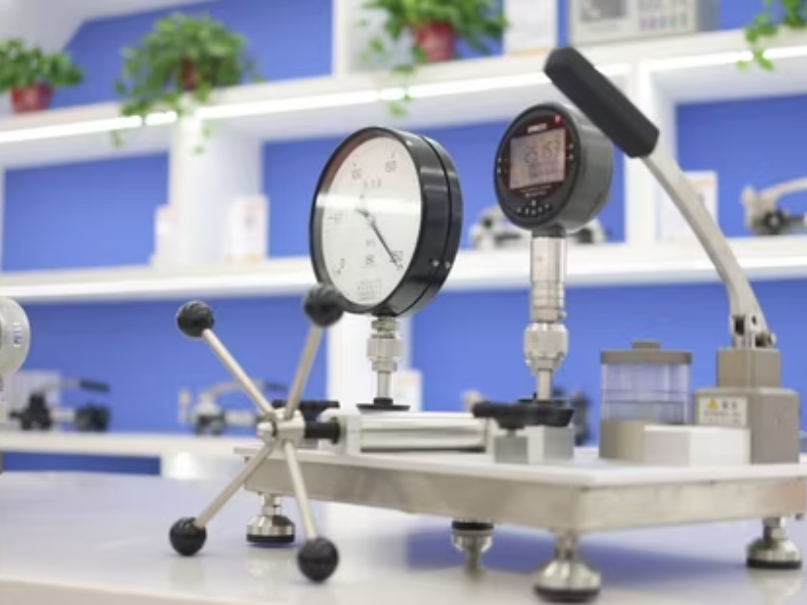
Pressure gauges should be calibrated at least once every 6 to 12 months in the UAE, depending on the application, industry standards, and how frequently they are used. Regular calibration ensures accurate pressure readings, improves safety and helps facilities comply with local and international regulations. This guide will help you understand when, why and how often to calibrate pressure gauges in UAE industries.
In the UAE’s fast-paced sectors like oil and gas, manufacturing, HVAC, food processing and healthcare, accurate pressure readings are essential for quality, safety and efficiency. Dubai and other emirates also have strict standards for equipment accuracy, making routine calibration even more important in 2025 and beyond.
What is Pressure Gauge Calibration?
Calibration is the process of checking and adjusting a pressure gauge to ensure its readings match a known standard. It involves comparing the gauge to a certified reference and making corrections if necessary.
Key purposes of calibration:
- Ensure accurate pressure measurements
- Identify drift or wear over time
- Maintain safety in systems involving gases or liquids
- Meet industry and legal compliance requirements
Pressure gauges can lose accuracy due to continuous use, temperature changes, vibrations and exposure to harsh environments, all of which are common in the UAE.
Why Is Calibration So Important in the UAE?
In regions like Dubai, Abu Dhabi and Sharjah, pressure gauges are widely used in buildings, factories, refineries and labs. When gauges are not calibrated properly, it can lead to serious risks, including:
- Equipment failure
- Safety hazards (e.g., gas leaks, pressure build-up)
- Poor product quality
- Regulatory non-compliance
- Costly downtime and repairs
Regular calibration is not just a technical task, it’s a safety and quality practice that protects people, equipment and the environment.
How Often Should You Calibrate Pressure Gauges?
The frequency of calibration depends on several factors, including:
1. Industry Standards
- Oil & Gas / Chemical Plants: Every 3 to 6 months
- Pharmaceutical / Medical: Every 6 months or as per ISO standards
- Manufacturing / HVAC / Food Processing: Every 6 to 12 months
- General Use / Commercial Buildings: Every 12 months
2. Application Criticality
If the pressure gauge is used in safety-critical or high-precision applications (like gas pipelines or medical devices), calibration should be more frequent, possibly quarterly.
3. Environmental Conditions
In the UAE, extreme heat, sand, humidity and vibration can affect gauge performance. Facilities exposed to these factors should consider shorter calibration intervals.
4. Usage Frequency
The more often a gauge is used, the more quickly it may drift from accurate readings. Heavy-use gauges should be calibrated more often than backup or rarely used ones.
Signs Your Pressure Gauge Needs Calibration
While regular schedules are best, sometimes gauges show signs that they may need recalibration sooner.
Look out for:
- Inconsistent or fluctuating readings
- Physical damage or a worn-out display
- The needle is not returning to zero
- Complaints of system underperformance
- Recent shock, vibration or environmental stress
If any of these signs appear, it’s wise to schedule calibration immediately to avoid further issues.
Best Practices for Pressure Gauge Calibration in UAE
If you manage a facility in the UAE, here are some best practices to follow when setting up a pressure gauge calibration program:
1. Follow a Scheduled Plan
Create a calibration calendar based on your industry needs and application type.
2. Keep Accurate Records
Maintain a logbook or digital database of all calibrations, including dates, technician names, test results and next due date.
3. Use Certified Equipment
Always calibrate with traceable, certified instruments that meet international standards such as ISO/IEC 17025.
4. Partner with Trusted Calibration Services
Ensure your calibration provider understands local UAE regulations and delivers prompt, professional service.
5. Label Calibrated Gauges
Clearly mark each gauge with its last calibration date and next due date to avoid confusion.
Regulatory and Compliance Requirements in the UAE
Several sectors in the UAE require regular calibration to comply with legal and quality control standards. Here’s what you should be aware of:
- Municipal regulations in Dubai often require calibration as part of safety audits.
- DCD (Dubai Civil Defence) and ESMA (Emirates Authority for Standardization and Metrology) emphasize accuracy in mechanical and HVAC systems.
- ISO 9001, ISO 17025, and ISO 13485 all require calibration as part of quality assurance.
Non-compliance can lead to fines, failed inspections or even temporary shutdowns, making timely calibration essential.
Common Equipment That Needs Regular Calibration
Many devices in UAE facilities rely on pressure measurement and require scheduled calibration.
Examples include:
- HVAC system gauges
- Boiler pressure gauges
- Fire suppression system gauges
- Medical gas gauges
- Industrial compressors and pumps
- Laboratory instruments
Each of these has a direct impact on safety and performance and should be checked periodically.
How Long Does Pressure Gauge Calibration Take?
In most cases, the calibration of a single pressure gauge can be completed in 30 to 60 minutes by a professional technician. Larger facilities may schedule batch calibrations to be completed within a few hours or a full day, depending on the volume.
Some advanced service providers in the UAE also offer on-site calibration to reduce downtime and avoid removing equipment from active systems.
What Happens During Calibration?
Calibration follows a simple but careful process:
- Inspection: Technicians inspect the gauge for visible damage or issues.
- Testing: The gauge is compared against a known reference standard.
- Adjustment: If there is a deviation, adjustments are made to correct the reading.
- Verification: The corrected gauge is tested again to confirm accuracy.
- Documentation: A certificate or report is provided as proof of calibration.
A good calibration report includes:
- Date of calibration
- Reference standard used
- Pre- and post-calibration results
- Tolerance levels
- Certification traceability
Benefits of Regular Pressure Gauge Calibration
Regular calibration offers multiple advantages for any business or facility operating in the UAE.
Key benefits:
- Better safety: Avoid accidents due to wrong readings
- Improved accuracy: Reliable measurements improve process control
- Compliance: Meet UAE regulatory and international quality standards
- Cost savings: Avoid unnecessary repairs and product defects
- Longer equipment life: Reduce wear and strain on connected systems
Future Trends in Pressure Gauge Calibration (2025 and Beyond)
As Dubai and other UAE cities move toward smart facilities and automated maintenance, calibration is also evolving.
- IoT-enabled pressure gauges: These send alerts when out of range or due for calibration.
- Cloud-based calibration tracking: Helps facilities manage schedules and certificates online.
- Automated calibration stations: Speed up the process with AI and robotics in large-scale industrial plants.
In 2025, UAE businesses that embrace these trends will benefit from more efficient operations and better compliance.
Conclusion
To sum up, accurate pressure measurement is crucial in maintaining safe and efficient operations in any UAE facility. By calibrating your pressure gauges regularly, typically every 6 to 12 months, you protect your equipment, stay compliant with regulations and ensure quality in every process.
If you are looking for reliable, certified and professional calibration services in Dubai or across the UAE, V Tech Group is here to help. With a skilled team and advanced tools, we deliver precise calibration solutions tailored to your industry needs.
To schedule a consultation or learn more about our calibration services, feel free to get in touch with us today.



